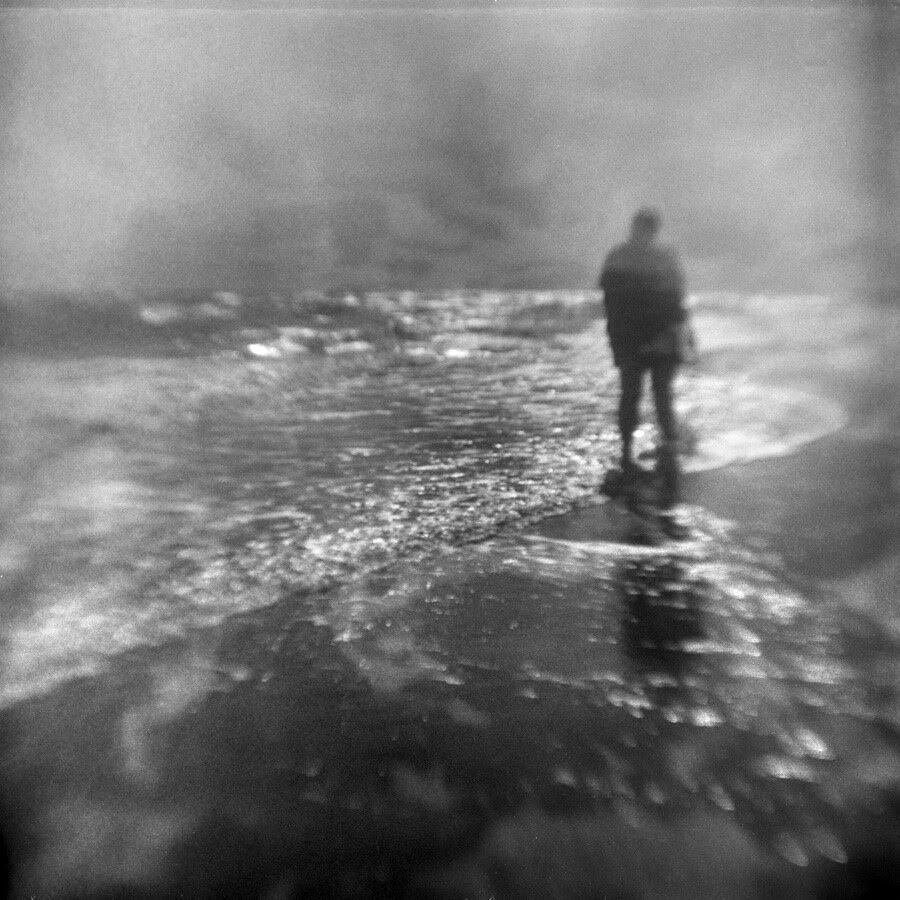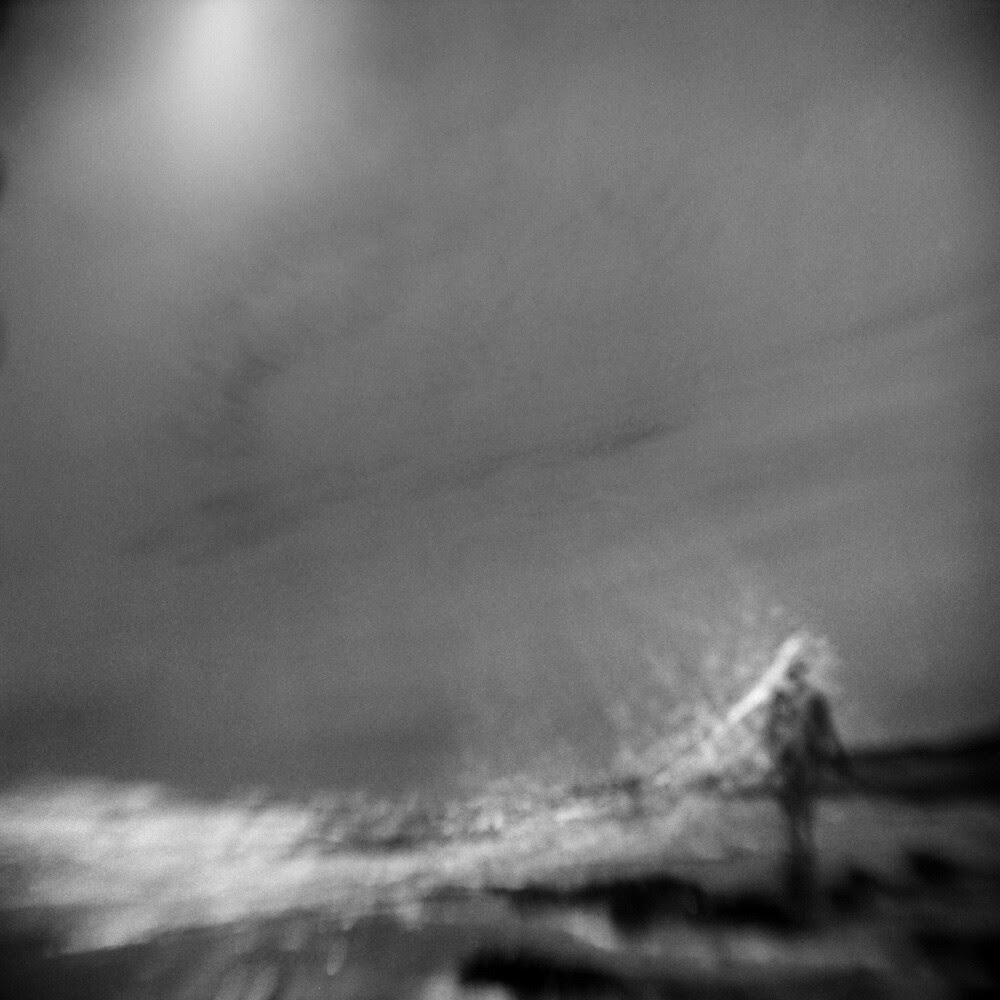.

To Fall or Run (Lower Darnley, Prince Edward Island): photo by Jim Rohan, 29 September 2012
O baffled, balk’d, bent to the very earth,
Oppress’d with myself that I have dared to open my mouth,
Aware now that amid all that blab whose echoes recoil upon me I have not once had the least idea who or what I am,
But that before all my arrogant poems the real Me stands yet untouch’d, untold, altogether unreach’d,
Withdrawn far, mocking me with mock-congratulatory signs and bows,
With peals of distant ironical laughter at every word I have written,
Pointing in silence to these songs, and then to the sand beneath.
I perceive I have not really understood any thing, not a single object, and that no man ever can,
Nature here in sight of the sea taking advantage of me to dart upon me and sting me,
Because I have dared to open my mouth to sing at all.
Oppress’d with myself that I have dared to open my mouth,
Aware now that amid all that blab whose echoes recoil upon me I have not once had the least idea who or what I am,
But that before all my arrogant poems the real Me stands yet untouch’d, untold, altogether unreach’d,
Withdrawn far, mocking me with mock-congratulatory signs and bows,
With peals of distant ironical laughter at every word I have written,
Pointing in silence to these songs, and then to the sand beneath.
I perceive I have not really understood any thing, not a single object, and that no man ever can,
Nature here in sight of the sea taking advantage of me to dart upon me and sting me,
Because I have dared to open my mouth to sing at all.
Walt Whitman: from As I Ebb'd with the Ocean of Life, 1881, first published as Bardic Symbols in The Atlantic Monthly, April 1860

Toward Seaview (Lower Darnley, Prince Edward Island): photo by Jim Rohan, 22 July 2011

The Raging Sea (Darnley Beach, Lower Darnley, Prince Edward Island): photo by Jim Rohan, 13 July 2013

Salacia (Lower Darnley, Prince Edward Island): photo by Jim Rohan, 6 December 2013

Where the Ocean Began (Darnley Beach, Lower Darnley, Prince Edward Island): photo by Jim Rohan, 15 June 2013

North Wind (Darnley Beach, Lower Darnley, Prince Edward Island): photo by Jim Rohan, 10 March 2011

Big Ocean #2: photo by Jim Rohan, 31 January 2012

Nelson Island #11 (Rowley, Massachusetts): photo by Jim Rohan, 29 January 2014



9 comments:
This is one of those where you pass right through the art and nod your head in recognition and sad agreement. But at least I know about Holga now. Curtis
this post and the previous post make a wonderful contrast - i'm reminded of the "two pockets" advice of Rabbi Simcha Bunam
Rabbi Jack Moline: Rabbi Simcha Bunam used to say, "Every person should have two pockets. In one, [there should be a note that says] bishvili nivra ha'olam, 'for my sake was the world created.' In the second, [there should be a note that says] anokhi afar va'efer, 'I am dust and ashes.' One must know how to use them, each one in its proper place and right time. For many make the mistake of using them in their opposite applications." That is to say, too often, when we should be acknowledging our arrogance, we are defending it. And when we should be overcoming our self-denigration, we are confirming it.
Jacob Needleman, Money and the Meaning of Life: "A Freudian psychoanalyst once summed up to me his vision of the human condition by saying that man is not as bad as he thinks he is, nor can he become as good as he dreams of becoming. The assumption of this book is precisely the opposite of the psychoanalytic view: man is in far worse condition than he believes, but he can become far greater than he imagines."
Jeffrey M. Schwartz, A Return to Innocence: Philosophical guidance in an age of cynicism: "We often hear the phrase 'Knowledge is power' -- but nowhere is it truer than when it comes to knowledge of ourselves."
Dare I open my mouth and blab the hackneyed
Pedestrian—truer words were never spoken.
Whitman's grandiose expectations for Leaves of Grass, published five years earlier, had not been fulfilled, and, in a note extremely unusual for him, here we find him apparently chastened by the extravagant effusiveness he had showered upon the public.
Self aggrandizement, self-chastisement, an intelligible emotional rhythm, reminding us the poet was a sensitive human being, capable of embarrassment as well as button-bursting blowing-out of the Big Pipes.
This post touches on memories that, like Rohan’s terrific photos, are blurred and indistinct, yet their content is still recognizable, a validation of what was. Leaves of Grass was my boon companion many years ago, when I rode the train across Patagonia from Bariloche to B.A., a journey of some days time. I’d read a few verses, then look out at the pampas that seemed to drift past (it was a slow train). It felt like the words were forming a connection between the two Americas. That was Whitman’s generous, embracing spirit coming through. In my estimation, Walt was never less that magnificent.
Oh, this is a nice counterpoint to Whitman's usual tune. How nice to read it. And how nice to find out who Holga is. I am a Holga fan, no doubt about it.
Of Whitman I remember how my grandmother thought he was a complete buffoon. And how my father thought all poets were buffoons. And I, I said I was a fan of buffoons. Or that one must be, at some point, willing to be a buffoon. That, I thought, would be my theses in philosophy, should I have ever pursued such a useless degree.
(All my degrees are useless.)
And I do like the Rabbi's pockets. The two pockets, that is.
I suppose I imagined that might have been a bewildered Walt, there wandering the shore, in Jom Rohan's photos.
Buffoonery, in the right place and at the right time, is surely fair enough -- as is appreciating a bit of enlightened buffoonery.
Whitman on a slow train over the Andes -- wonderful thought.
Though Leaves of Grass had been generously reviewed, Whitman had hoped for more than a literary success -- he had intended nothing short of a spiritual make-over of America, at a moment when the nation stood at the brink of the great sundering of a civil war.
But no poet yet has changed America. And there was disappointment in recognizing that.
Not long after the publication of Leaves he wrote, "Everything I have done seems to me blank and suspicious. -- I doubt whether my greatest thoughts, as I supposed them, are not shallow -- and people will most likely laugh at me. -- My pride is impotent, my love gets no response. -- The complacency of nature is hateful -- I am filled with restlessness. -- I am incomplete."
Also figuring in the troubled emotional situation, as is evident in another passage here, is the loss of the poet's father, who had passed shortly after Leaves came out.
I throw myself upon your breast my father,
I cling to you so that you cannot unloose me,
I hold you so firm till you answer me something.
The poem as originally writ also contained some arresting lines that propose to invite the reader to confront death itself -- not only that of his father, but his own. "See, from my dead lips the ooze exuding at last,/ See, the prismatic colors glistening and rolling." James Russell Lowell, editor of The Atlantic Monthly, found those lines too much to take, and snipped them out.
But while awkward and uneven at times, the poem maintains that unique intimacy with readers -- a sort of trust -- that remains Whitman's greatest creation.
The sense of vulnerability projected by this poem enhances its value, for me. Admitting one is feeling uncomfortable about having shot one's mouth off -- never easy to do. And all the more welcoming, humanizing, for that.
I can't imagine another American poet grand enough to carry one over the snows into Patagonia...
But what would be in that other pocket?
That "sense of vulnerability" is very moving. He's taken the risks in language as a human subject - a true courage there. You can't help but feel tender towards him - even with those occasional gobshite lines.
Exactly.
Post a Comment